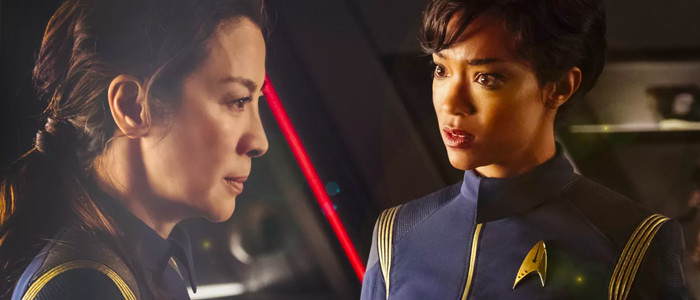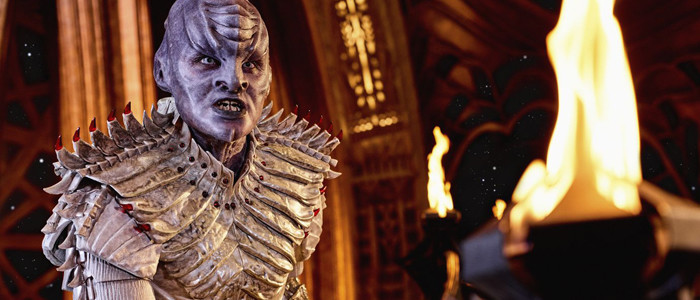'Star Trek: Discovery' Is A Lot Of Fun (And A Little Confusing) For 'Trek' Newbies
(We are running two reviews of Star Trek: Discovery – one from an old school Star Trek fan and one with less experience in this iconic universe. Here is the second of the two reviews.)Star Trek: Discovery feels like J.J. Abrams' Trek films.
Your mileage may vary on whether or not that's a good thing. For me, a non-Trekkie whose familiarity with the universe doesn't really extend beyond the original series timeline, I had no idea what to expect with this new series. But my enjoyment of the Abrams movies – including the Justin Lin-directed Star Trek Beyond, which Abrams produced – was enough to carry me through the first two episodes of Discovery with a basic understanding. If you're also a non-Trekkie looking for a series gateway, this is a good place to start.
Though even I can tell the fabric of Discovery lacks the quintessential optimism of Trek creator Gene Roddenberry. This is a series about war, and how war breaks down the good people involved. To that effect, the magic chemistry that made Team Spock and Kirk gel seems disparate here, though perhaps necessarily. The crew aboard the Shenzhou (the titular Discovery doesn't appear in the premiere) fight and bicker, their camaraderie consistently tested. This is, again, in tandem with the plot, but I do wonder why this sort of story was the desired choice of the creators. The wonder and joy of space travel would be a welcome respite from our frantic reality – I worry that public interest in Discovery might taper off should the show remain as grim-dark as this premiere. (Although maybe a hope-fueled Trek wouldn't hold up in the Game of Thrones era of television.)
Warning: spoilers for the first two episodes lie ahead, so if you haven't seen the show yet, beam out of here and come back to read it after you've caught up.
If there's one thing Discovery does borrow from Roddenberry, its a dedication to diversity. The series follows First Officer Michael Burnham, played by black actress Sonequa Martin-Green, who is truly excellent as a Vulcan-raised human, in the vein of Spock. Michael is on the path to her own command when we first meet her, walking through a Mad Max-esque dessert with Captain Phillipa Georgiou (Michelle Yeoh). The relationship between the two is lovely – full of trust and compassion – and I was eager to follow their story this season. Unfortunately, Phillipa dies in episode 2, and the season trailer teases Jason Isaacs as the primary Captain role of the season. I'm sure he'll be great, but I did groan at an Asian woman dying so that a white man can step in. I have to hope that Phillipa will pop up again in flashbacks, which the show is already using liberally. And I'm still thrilled that we get to follow Michael on this journey – her masculine name and styling feel decidedly non-binary, which is another neat bit of representation cloaked in Starfleet attire.
Admittedly, Discovery started to lose me when it got heavy into history stuff that I'm sure means a lot to dedicated fans, but washed over me entirely. I have only a passing knowledge of the Klingon race, so the opening sequence didn't grab me, and their new design seemed at silly ends with the heavy dialogue they were passing off. I don't know how I feel about them as the season's Big Bad – it seems like a deliberate choice to keep newbies engaged, as Klingons are the most familiar Trek villains, but I don't know that it really works. They don't feel sustainably interesting at this point, and though their pseudo-religious vibe could make for some fascinating real-world parallels, I imagine the long subtitled sequences could drive people away more than it might rope them in.
I was also unaware until looking it up that Michael's Vulcan mentor is the father of Spock (did I miss a line of dialogue?) – which seems odd, given the proximity of this series to the original. Does that mean Michael and Spock grew up together? Did Spock have a sort-of sister this whole time? Even as a non-fan, I worry at how this bit of information might affect the pre-established canon, and I also worry that Discovery might lean too heavily on it as a bit of connective tissue. If this were the J.J. Abrams nu-verse, it might be a neat way of getting a Zachary Quinto cameo down the road. As it stands, the series is set in the prime universe, so it feels a little off.
Which brings me to my overall thought about Star Trek: Discovery: Why isn't this set in the new universe? I know it'd be a major gripe of long-term Trekkers, but this series already feels like it was created less for them than for a new era. The cinematic look of the show, the serialized story, how closely it aligns with the original series, and the flashy reliance on scope and cliffhangers all feel like products of the new Trek movies anyway. Why not lean in? Maybe that's just the sort of thing a non-Trek person would say, but it feels like a sticking point. The polished look of Discovery is going to make for an odd coupling with the original series anyway – it seems smarter to avoid that entirely and go boldly into the new canon. For now, Discovery is having its cake and eating it too.
All that said, would I recommend the show to other Trek newbies? Sure, but with hesitation. I felt a whisk of excitement as the second episode ended with Michael's imprisonment, and the season trailer looks beautiful and promising. The premiere feels like the precursor for what could be a lush and thrilling new series. But if Discovery keeps laying into the well-known but not exactly indelible lore, it may lose me and I imagine the others looking for an easier way in. It has promise, and I mostly enjoyed the two hours I spent in the Trek universe, but it'll have to work hard to justify that CBS All Access subscription in the coming weeks.


